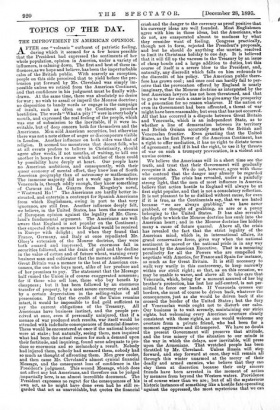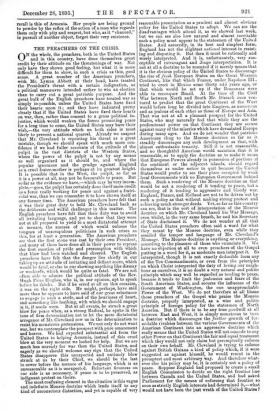TOPICS OF THE DAY • THE IMPROVEMENT IN AMERICAN OPINION.
AFTER one " volcanic " outburst of patriotic feeling, during which it seemed for a few hours possible that the President had expressed the sentiments of her whole population, opinion in America, under a variety of influences, is calming down. The first and best of these in- fluences,as we hope and believe, has been the imperturbable calm of the British public. With scarcely an exception, people on this side perceived that to yield before the pre- tension put forward by Mr. Cleveland was simply im- possible unless we retired from the American Continent, and that confidence in his judgment must be finally with- drawn. At the same time, there was absolutely no desire for war ; no wish to assail or imperil the Monroe doctrine ; no disposition to bandy words or engage in the campaign of insult, such as often on the Continent precedes hostilities. The words " What a pity 1" were in everybody's mouth, and expressed the real feeling of the people, which was one of submission to the inevitable, if it were in- evitable, but of deep concern both for themselves and the Americans. Men sold American securities, but otherwise there was not a note either of anger or discomposure visible in London. Another influence on both sides was that of religion. It seemed too monstrous that decent folk, who at all events profess to believe in Christianity, should agree after weeks, if not months, of waiting, to kill one another in heaps for a cause which neither of them could by possibility have deeply at heart. Our people have no American ambitions, and consequently, with their queer economy of mental effort, they know less of South American geography than of astronomy or mathematics. The immense majority did not a week ago know where Venezuela is, though oddly enough, they know something of Caracas and La Guayra from Kingsley's novel, "Westward Ho ! " The Americans are hardly better in- structed, and entertain a contempt for Spanish Americans from which Englishmen, owing in part to that very ignorance, are still free. Another influence deeply felt, we believe, in the United States, has been the consensus of European opinion against the legality of Mr. Cleve- land's fundamental argument. The Americans are well aware that England is not popular on the Continent ; they expected that a menace to England would be received in Europe with delight ; and when they found that France, Germany, and Italy at once repudiated Mr. Olnefs extension of the Monroe doctrine, they were both amazed and impressed. The enormous fall in securities followed, and the drain of gold and the decline in the value of cotton and of future wheat, warning every business man and cultivator that the menace addressed to Great Britain was a, menace to the best of American cus- tomers, the one who buys most, alike of her produce and of her promises to pay. The statement that the Message half ruined the Union is of course exaggerated nonsense ; for if those who sell lose, those who buy benefit by cheapness ; but it has been followed by an enormous transfer of property, by a most severe currency crisis, and by a certain depreciation in the selling-value of all possessions. But that the credit of the Union remains intact, it would be impossible to find gold sufficient to pay the current obligations of the Treasury. All Americans have business instinct, and the people per- ceived at once, even if personally uninjured, that if a menace of war produced such results, war itself would be attended with indefinite consequences of financial disaster. These would be encountered at once if the national honour were at stake ; but naturally, seeing them, men inquired what had been the actual reason for such a demand upon their fortitude, and. inquiring, found none adequate to pro- duce so enormous and so melancholy a result. Nobody had injured them, nobody had menaced them, nobody had so much as thought of affronting them. Men grew cooler, and then came Mr. Cleveland's almost cynical financial Message, and the consequent loss of confidence in the President's judgment. This second Message, which does not affect any but Americans, and therefore can be judged Impartially here, is an almost incredible document. The President expresses no regret for the consequences of his own act, as he might have done even had he still re- garded that act as unavoidable, but quotes the financial crash and the danger to the currency as proof positive that his currency ideas are well founded. Most Englishmen agree with him in those ideas, but the Americans, who do not, are exasperated almost to madness by what they consider want of feeling. Congress practically,. though not in form, rejected the President's proposals, and lest he should do anything else unwise, resolved to limit its Christmas holiday to one day. It is believed that it will fill up the vacuum in the Treasury by an issue of cheap bonds and a large addition to duties but this course of itself is a severe blow to the President, and, naturally, any discredit which falls on him redounds to the discredit of his policy. The American public there- fore has grown cool ; and once cool can hardly fail to per- ceive that the provocation offered by England is nearly imaginary, that the Monroe doctrine as interpreted by the best American lawyers has not been threatened, and that to go to war for such a cause is to give away the prosperity of a generation for no reason whatever. If the nation or even its Government had been affronted, a threat of war might have been reasonable; but even that has not occurred.. All that has occurred is a dispute between Great Britain and Venezuela, which is an independent State, as to whether a line of demarcation between its territory and British Guiana accurately marks the British and Venezuelan frontier. Even granting that the United States, as the first Power of the American Continent, has a right to offer mediation, it has no right to dictate terms of agreement ; and if it had the right, to use it by threats of war on such a trumpery provocation, is a violent and unwise course.
We believe the Americans will in a short time see the" truth, and trust that their Government will gradually recognise it also. We do not, however, agree with those who contend that the danger may already be regarded as overpast. The crisis has revealed, under a painfully. strong light, that the men of most influence in America believe that action hostile to England will always be at first sight popular, and that is not a consolatory reflection. It is not pleasant to be so disliked without cause, for even if it is true, as the Continentals say, that we are bated because "we are always grabbing," we have never grabbed, or thought of grabbing, an acre or a penny belonging to the United States. It has also revealed the depth to which the Monroe doctrine has sunk into the American heart ; and in the Monroe doctrine lies hidden many a cause of future quarrel. Above all, the crisis has revealed the fact that the strict legality of the American mind, which is, in international affairs, its grand conservative force, gives way when the national sentiment is moved or the national pride is in any way aroused by the American Executive. That is a menacing peculiarity for all the Powers who are compelled to negotiate with America, for France and Spain for instance, as much as for Great Britain. It is still necessary to walk very warily in this controversy, to keep narrowly within our strict right ; so that, as on this occasion, we may be unable to waver, and above all to take care that Venezuela, which, being for a moment assured of her big brother's protection, has lost her self-control, is not per- mitted to force our hands. If Venezuela crosses our borders, she must of course be driven back, whatever the consequences, just as she would be driven back if she crossed the border of the United States ; but the fury of Venezuelan words ought not to disturb our calm. Our business is to wait serenely, maintaining our strict rights, but welcoming every American overture clearly consistent with those rights, as one would welcome any overture from a private friend, who had been for a moment aggressive and ill-tempered. We have no doubt the present Government will preserve that attitude, and the true misery of the situation to our minds is the way in which the delays, now inevitable, will press upon the Armenians. That wretched people has been throttled by Mr. Cleveland. Unless Russia will step forward, and step forward at once, they will remain all through this winter Unarmed at the mercy of their deadly and armed enemies, who believe that they can slay them at discretion because their only sincere friends have been arrested in the moment of action by menaces from beyond the Western waters. Providence is of course wiser than we are; but of all the mysterious historic instances of something like a hostile fate operating against the oppressed, the most mysterious that we can recall is this of Armenia. Her people are being ground to powder by the reflex of the action of a man who regards them only with pity and respect, but who, as it "chanced," in pursuit of another object, forgot their very existence.



































 Previous page
Previous page